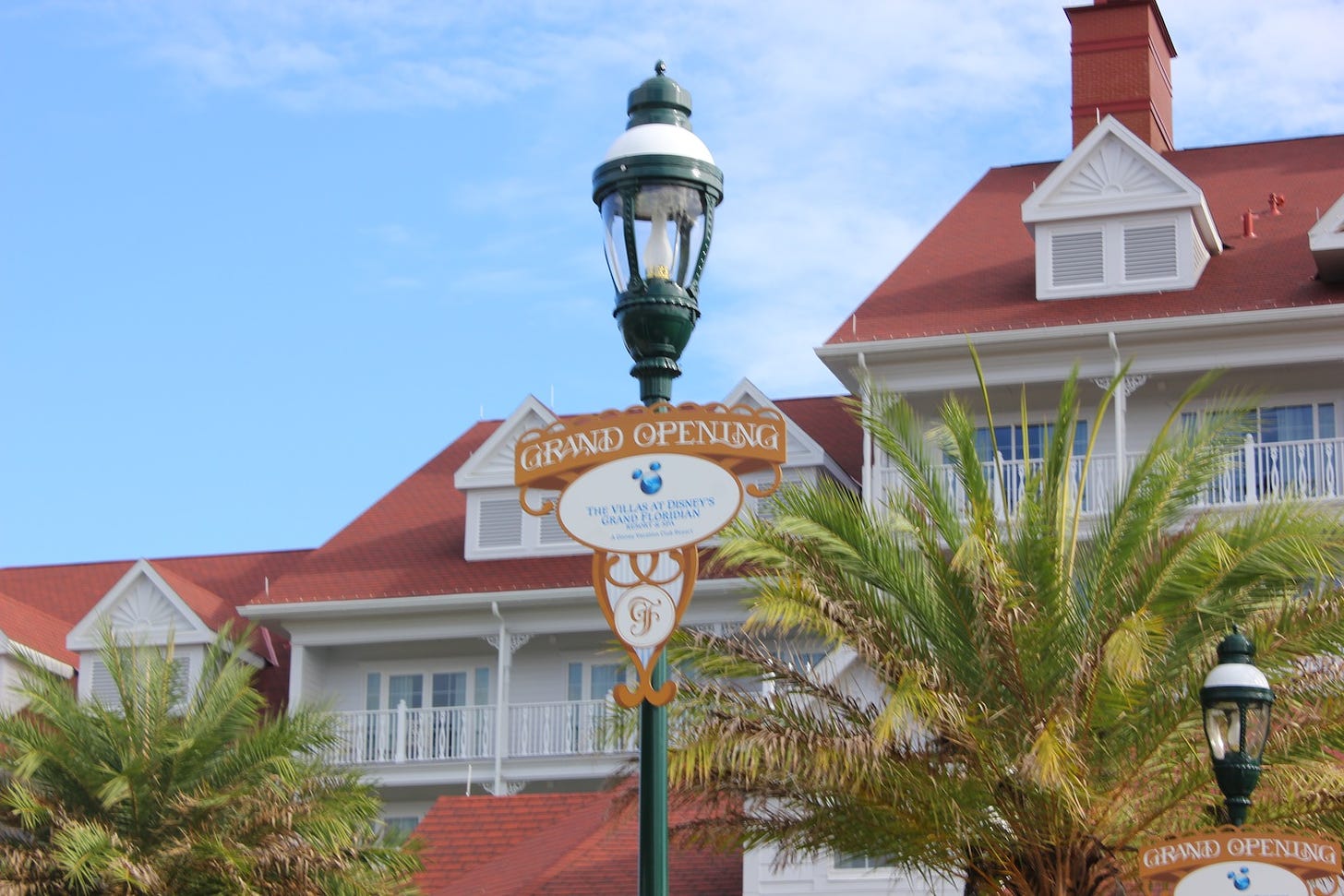Florida leaders are talking tough about Disney. They may give the company a big tax break, too.
Disney would likely save hundreds of thousands of dollars a year in property taxes under a timeshare tax break moving through the Florida Legislature.

This is Seeking Rents, a newsletter and podcast devoted to producing original journalism — and lifting up the journalism of others — that examines the many ways that businesses influence public policy across Florida, written by Jason Garcia. Seeking Rents is free to all. But please consider a voluntary paid subscription, if you can afford one, to help support our work.
Gov. Ron DeSantis and Republican leaders in the Florida Legislature sure want the world to think they’re being tough on the Walt Disney Co. right now.
They’re trying to dissolve Walt Disney World’s long-term development plan. They want to start regulating Disney’s famed monorail. DeSantis has even “joked” about building a state prison at the giant resort.
And yet — amid all the anti-Disney theatrics — lawmakers are also rushing ahead with a tax break that would save Disney hundreds of thousands of dollars a year in property taxes. Maybe more.
This tax break for Disney is tucked inside House Bill 451, a bill that would rewrite the rules around how timeshares are appraised for tax purposes.
Boosters say they are trying to help people who bought timeshares years ago and are now stuck paying inflated property tax bills every year. But the biggest savings by far would go to big timeshare developers like Disney’s Disney Vacation Club, Marriott Vacations Worldwide Corp., and Travel + Leisure Co. (the company formerly known as Wyndham Destinations).
After languishing in the Legislature for weeks, the bill started rocketing through the Florida House of Representatives last week — right around the time DeSantis vowed a fresh round of retaliation against Disney. An identical bill is also in play in the Florida Senate (Senate Bill 1450).
So let’s take a closer look at how this tax break would work — and who would most benefit.
How much is a timeshare worth?
Let’s start with the way things work when it comes to timeshares and property taxes right now.
Under current law, when a property appraiser sets the value of a timeshare for tax purposes, they are supposed to first look at comparable sales on the resale market – sales in which an individual timeshare owner, who might have bought into a timeshare plan years ago, resells it to someone else.
But that only works if there are enough legitimate resales that can be used as accurate comps.
And the resale market is utterly flooded with illegitimate sales. Many owners are so desperate to get out of paying the expensive annual dues on their timeshare that they will pay someone to take it off their hands. Unscrupulous “exit” companies con sellers into especially bad deals. And the developers manipulate the process, too, by making it less appealing for buyers to purchase on the secondary market — in order to keep as many people as possible buying directly from them.
If a property appraiser can’t find enough legitimate resales to use as comps, the law requires them to instead to base their appraisals on prices charged by timeshare developers — the companies like Disney, Marriott and Wyndham, which collectively sell billions of dollars’ worth of timeshares every year.
That’s what property appraisers usually end up doing.
But timeshare owners complain that this leads to unfairly inflated property values — and unfairly inflated property tax bills — because developers charge far higher prices than any individual owner ever could.
High-stakes litigation
This has been the subject of some high-stakes litigation in recent years.
In one case, which involved a Wyndham timeshare in Osceola County, owners sued the local property appraiser, arguing that the timeshare had been over-assessed by more than 60 percent. But the judge sided with the property appraiser, noting in her ruling that there was rampant “illegal and illegitimate activity” on the resale market.
A similar case is now awaiting a ruling in Orange County. That one involves Marriott’s Grande Vista, a 900-unit timeshare across the street from SeaWorld Orlando.

One of the owners there happens to be a former Republican state legislator from Utah. And he helped organize the hiring of a former Republican legislator in Florida who is now a Tallahassee lobbyist — who then helped write the legislation that became HB 451.
Sponsored by Rep. Randy Fine, a Republican from Brevard County, the bill would essentially force property appraisers to use resale prices when appraising a timeshare — no matter how much illegal or illegitimate resale activity there may be.
The impact would be dramatic. Nonpartisan economists who studied the legislation earlier this year estimated that it would ultimately reduce the assessed value of timeshares in Florida by 75 percent.
Big savings for big developers
On one hand, you can sympathize with individual timeshare owners, many of whom were talked into buying by high-pressure salespeople and who immediately regretted their decision.
But on the other, there are two really big problems with this particular approach to helping them.

The first is that it would devastate cities, counties and schools in the Orlando area, where most of the state’s timeshares are concentrated.
The nonpartisan economists who studied HB 451 estimated that it would ultimately save timeshare owners — but cost cities, counties and schools — more than $200 million a year. And 80 percent of that hit would fall on just two central Florida counties: Orange and Osceola.
The second problem is that the biggest beneficiaries of those tax savings would be the timeshare developers — the companies like Disney, Marriott and Wyndham.
That’s because they own far more timeshare inventory than anyone else.
How much would it mean for Disney?
This brings us back to Disney.
Unfortunately, there’s no way to know exactly how much Disney would save if the Legislature passes HB 451 and DeSantis signs it into law.
But we can get a pretty good idea.
Let’s start with The Villas at Disney’s Grand Floridian Resort & Spa, which is one of two new timeshare properties that Disney is actively selling in Florida right now.
The Grand Floridian timeshare has an assessed value of about $170 million, according to Orange County property records.
If we use the same methodology as the economists who studied HB 451 did, the Grand Floridian’s assessed value would shrink by 75 percent — to just $43 million or so. That would have reduced its property tax bill by more than $3.4 million last year.
Disney has already sold a bunch of the inventory in the Grand Floridian. But according to DVCNews.com — an indispensable resource for news and information about Disney’s timeshare business — the company still owns about 46 percent of the property.
So Disney’s share of the tax savings would be nearly $1.6 million.
Now, Disney’s timeshares tend to hold their resale value far better than most other brands. So it’s very unlikely that the assessments on Disney’s properties would fall by 75 percent.
But even if the Grand Floridian’s assessment was reduced by just 10 percent because of HB 451, Disney would still save more than $200,000 in taxes on that one property. And those savings would continue, year after year.
What’s more, the Grand Floridian is just one of 10 timeshares that Disney owns in Orlando — which have a combined assessed value of roughly $3 billion. (Disney also has another timeshare in Vero Beach.)
Disney doesn’t own nearly as many units in its older timeshares. But it still owns some inventory in each, according to Tim Krasniewski, the publisher of DVCNews.com.
In fact, Krasniewski said Disney is contractually obligated to hang on to at least 2 percent of each property. And Disney periodically reacquires more units, too, either through foreclosures or by exercising a right of first refusal if an existing owner decides to sell. That allows Disney to keep some extra inventory on hand in case a buyer is especially interested in one of those older resorts.
Put this all together, and the result is that HB 451 would save Disney several hundred thousand dollars a year — at least.




